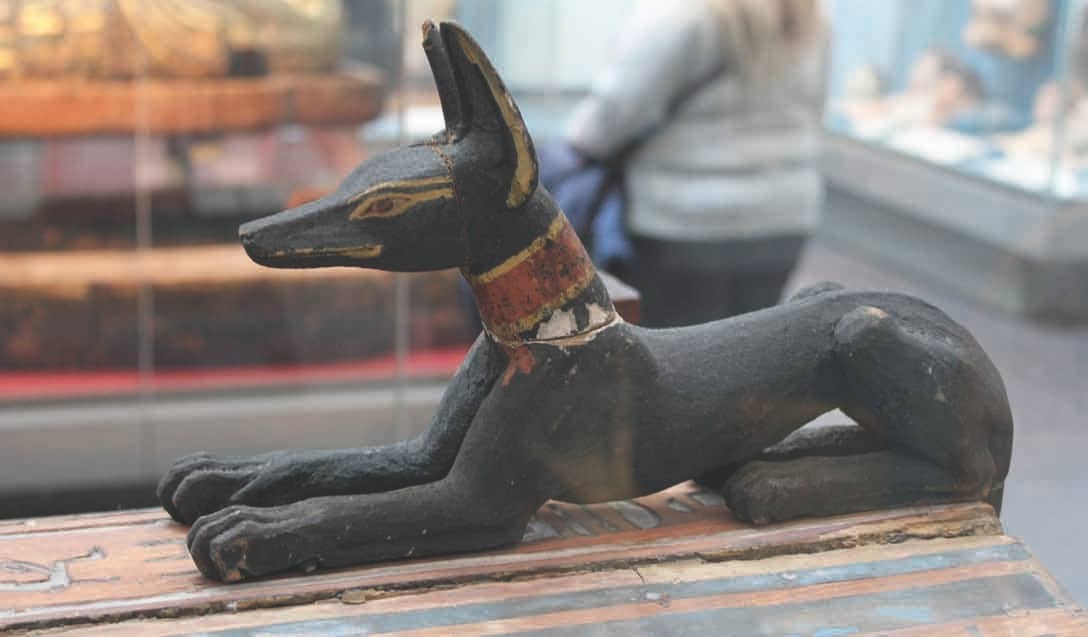
There has always been confusion as to whether representations of Anubis in his wholly animal, black form were of a jackal, wolf, dog or fox. However, in his anthropomorphic form, he is most frequently referred to as ‘jackal-headed’ and much of the mythology concerning him is based on that animal. Yet, the ancient Egyptian term for Anubis, sab, referred to several canines and not just to the jackal.
In Volume II (Euterpe) of the George Rawlinson version of History of Herodotus, the Greek historian wrote in Chapter 67 that: “The dogs are interred in the cities to which they belong, also in sacred places.” and a few sentences later that “… wolves, which are not much bigger than foxes, they happen to bury wherever they happen to find them lying.” So Herodotus in 440 BC and/or his translators/interpreters in AD 1875 were already differentiating between dogs (possibly domesticated or feral animals as they belonged in cities), wolves and foxes, but strangely omitting to mention jackals. Rawlinson then confused things further by saying in his footnote to that chapter that: “Herodotus is quite correct in saying that wolves in Egypt were scarcely larger than foxes. It is singular that he omits all mention of the hyena, which is so common in the country, and which is represented in the sculptures of Upper and Lower Egypt. The wolf is an animal of Upper and Lower Egypt. Its Egyptian name was ouonsh.” Again no jackal is mentioned, but hyenas are added to the mix.
この記事は Ancient Egypt の April / May 2020 版に掲載されています。
7 日間の Magzter GOLD 無料トライアルを開始して、何千もの厳選されたプレミアム ストーリー、9,000 以上の雑誌や新聞にアクセスしてください。
すでに購読者です ? サインイン
この記事は Ancient Egypt の April / May 2020 版に掲載されています。
7 日間の Magzter GOLD 無料トライアルを開始して、何千もの厳選されたプレミアム ストーリー、9,000 以上の雑誌や新聞にアクセスしてください。
すでに購読者です? サインイン

INSIDE THE STEP PYRAMID OF DJOSER
Sean McLachlan explores the recently reopened interior of this iconic Third Dynasty Saqqara monument.

PER MESUT: for younger readers
She Who Loves Silence

Highlights of the Manchester Museum 29: An Offering by Queen Tiye for her Husband
Campbell Price describes an offering table with a touching significance.

Highlights Of The Manchester Museum 28: Busts Of Jesse And Marianne Haworth
Campbell Price describes the significance of two statue busts on display in the Museum.

TAKABUTI, the Belfast Mummy
Rosalie David and Eileen Murphy explain how scientific examination of the ‘Belfast Mummy’ is revealing much new information about her life and times.

Lost Golden City
An Egyptian Mission searching for the mortuary temple of Tutankhamun has discovered a settlement – “The Dazzling of Aten” – described as the largest city ever found in Egypt (see above). Finds bearing the cartouches of Amenhotep III (see opposite, top) date the settlement to his reign, c. 1390-1352 BC – making it about 3400 years old.

Jerusalem's Survival, Sennacharib's Departure and the Kushite Role in 701 BCE: An Examination of Henry Aubin's Rescue of Jerusalem
BOOK REVIEWS

Golden Mummies of Egypt: Interpreting Identities from the Graeco-Roman Period by Campbell Price
BOOK REVIEWS

Old And New Kingdom Discoveries At Saqqara
An Egyptian team working on a Sixth Dynasty pyramid complex near the Teti pyramid at Saqqara has made a series of important discoveries.

Map Of Egypt
What’s in a name? It is easy for us to forget that the names we associate with the pyramids – such as the Meidum Pyramid, the Bent Pyramid or the Black Pyramid – would have been meaningless to their builders.